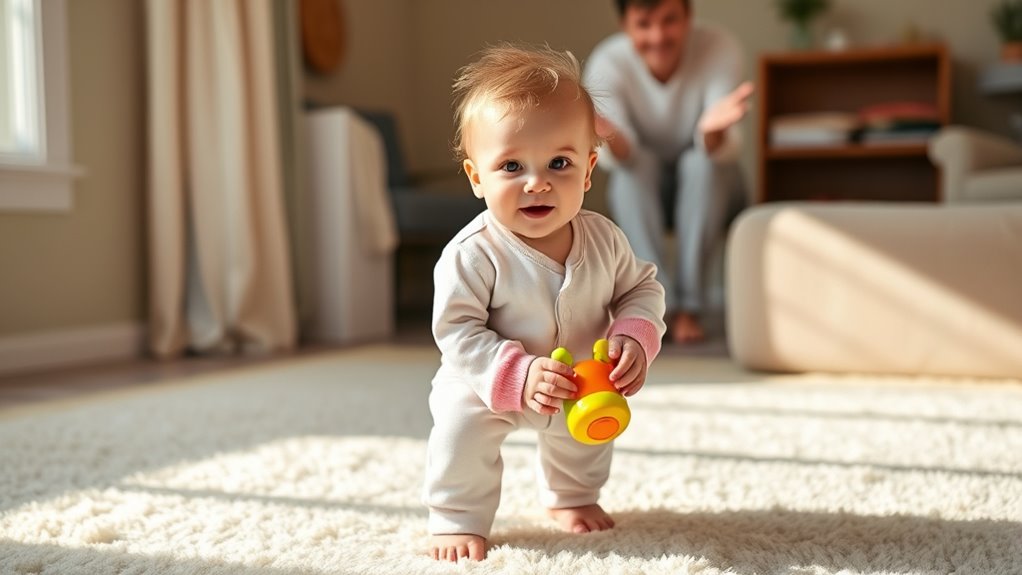Most babies begin to take their first steps between 9 and 15 months, but every child develops at their own pace. To support this milestone, encourage tummy time, provide safe spaces for practice, and offer stable furniture for cruising. Activities like balance games and confidence-building praise can help. Keep an eye on progress, and if concerns arise, consulting your pediatrician is always a good step. Find out more ways to nurture your little one’s walking journey below.
Key Takeaways
- Most babies begin walking between 9 to 15 months, but individual timing varies; look for signs of balance, pulling up, and cruising.
- Support your baby’s development with tummy time, encouraging standing and cruising, and creating a safe environment for exploration.
- Engage in balance and coordination activities like walking along low beams, climbing cushions, and tossing soft balls to build confidence.
- Celebrate small milestones with praise and gentle encouragement to boost your baby’s confidence in their walking abilities.
- Consult a pediatrician if your baby hasn’t started walking by 15 months or shows delayed motor development signs.
Typical Developmental Milestones Related to Walking
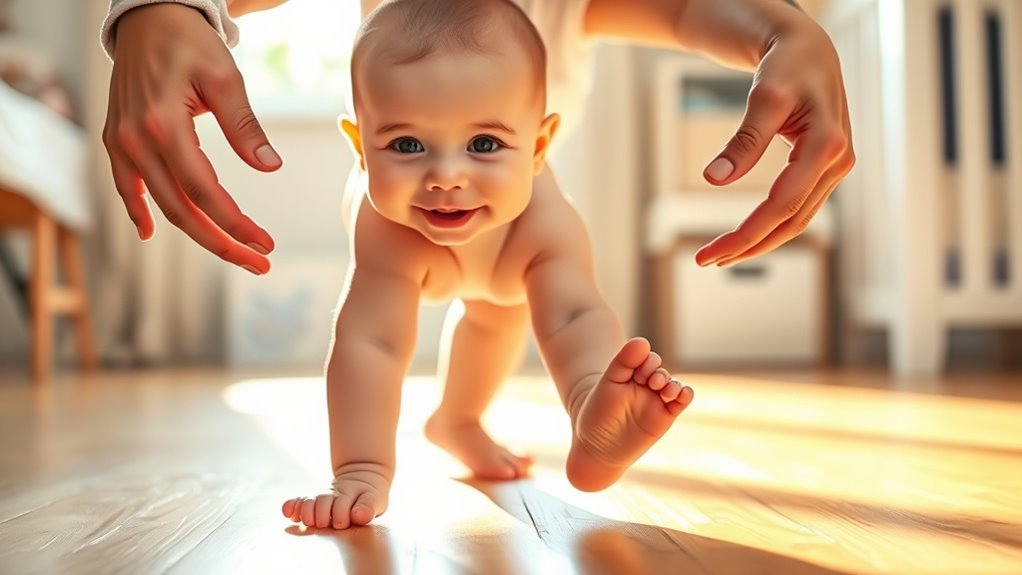
As your baby approaches their first year, you’ll notice several key milestones that indicate they’re getting ready to walk. Cultural practices often influence how families support these developments, but the core milestones remain similar worldwide. Sensory development plays a vital role; your baby’s increasing awareness of their environment helps build confidence to explore. Around this time, you’ll see them pulling up to stand, cruising along furniture, and trying to balance on their own. Fine motor skills, like grasping and hand-eye coordination, also improve, aiding in their overall mobility. These milestones show your baby’s growing strength and curiosity. Supporting their exploration with safe, engaging environments encourages progress, while cultural traditions can further motivate their motor skills and confidence. Additionally, understanding the typical timeline for best anime movies and other entertainment options can provide comforting routines and rewards during this developmental stage. Recognizing these milestones can also help parents tailor activities that promote motor skill development effectively.
Signs That Indicate Your Baby Might Be Ready to Walk
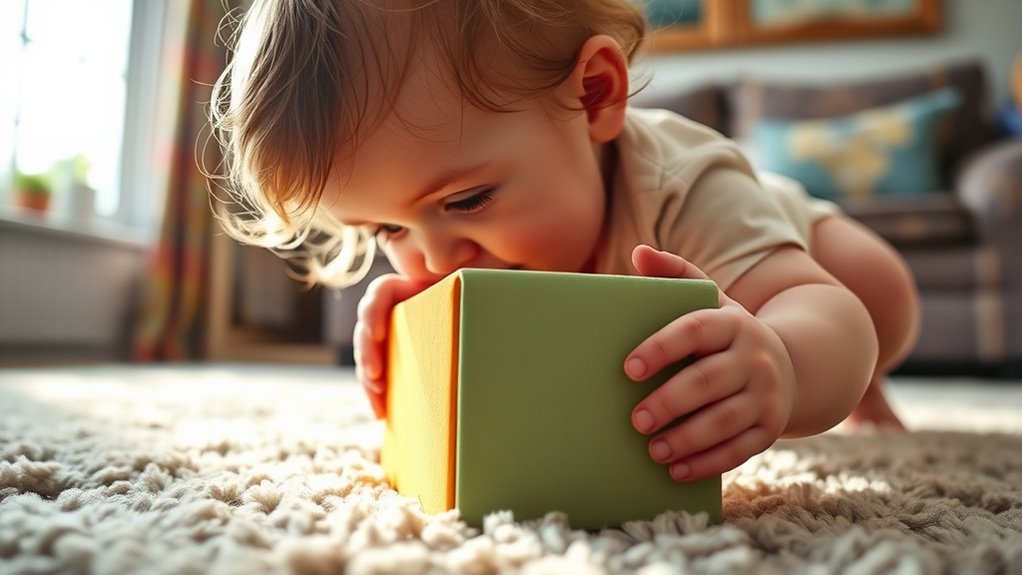
You’ll notice your baby gaining better balance and stability when they stand or sit. They might also show more interest in holding onto furniture and cruising along surfaces. These signs suggest they’re getting ready to take those first independent steps.
Physical Stability and Balance
When your baby begins to develop better physical stability and balance, you’ll notice certain key signs that indicate they’re ready to take their first steps. They may stand steadily with support, shift weight smoothly, or show improved posture development. These signs suggest their muscles and nervous system are coordinating well for walking. To support this progress, include simple balance exercises like assisted standing and gentle weight shifting. Encouraging these activities helps strengthen their core and improve stability. Watch for their ability to maintain posture without wobbling or leaning excessively. Once they consistently show these signs, your little one is gearing up for those exciting first steps. Keep fostering their confidence through safe practice and positive reinforcement. Recognizing motor skill development milestones can help you track their readiness and support their growth effectively. Additionally, ensuring their muscle strength is adequate will further facilitate confident walking as they continue to grow. Developing core stability through play and gentle activities can also enhance their balance and coordination. Building postural control is a crucial part of their progression toward independent walking, and engaging in activities that promote body awareness can further aid this developmental stage.
Interest in Standing and Cruising
Noticing your baby showing increased interest in standing and moving along furniture is a great sign they’re getting ready to walk. This curiosity often means they’re enthusiastic for independent exploration and want to mimic peers during social interactions. Look for these signs:
- Pulling up to stand frequently
- Cruising along furniture confidently
- Reaching out to grab objects while standing
- Showing enthusiasm when supported in an upright position
- Engaging more with peers during play
These behaviors indicate your baby’s muscles and coordination are developing, and they’re motivated to practice moving independently. Supporting this stage with safe, stable furniture and encouraging their efforts can boost their confidence. Being aware of developmental milestones can help you understand when walking might be approaching, and your little one is eager to take those next exciting steps. Recognizing muscle strength development is also important, as it plays a crucial role in your baby’s ability to walk. Additionally, understanding on-device AI capabilities can provide insights into how technology might soon assist in tracking developmental progress.
The Importance of Tummy Time and Its Role in Walking Development
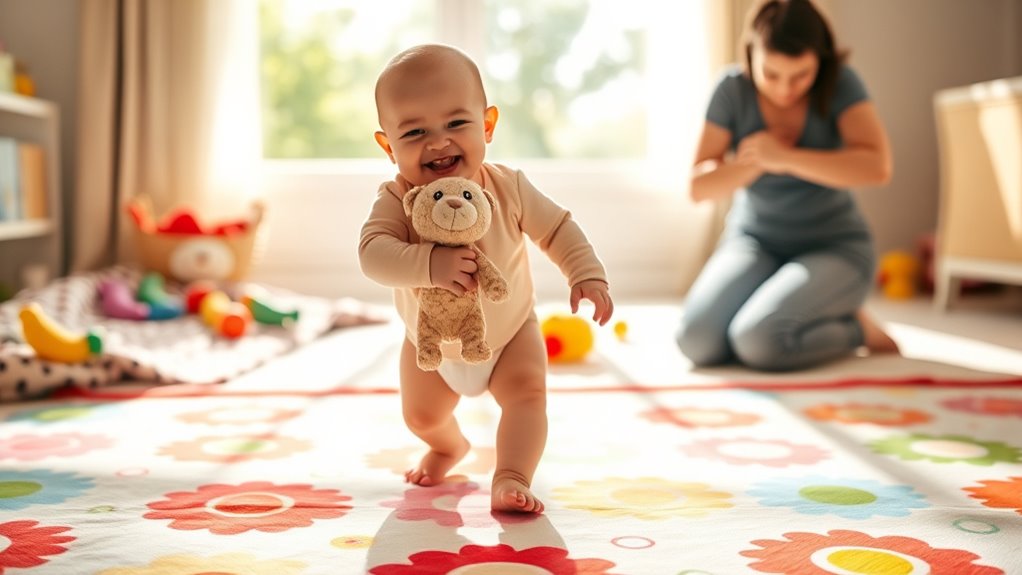
Tummy time helps your baby build the core strength needed for steady walking. It also improves their posture control and balance. As your baby gains confidence in moving, they’ll be more prepared to take those first steps. Additionally, ensuring proper muscle development through tummy time can positively influence the timing of their walking milestones. Being aware of developmental stages can help you better understand the environment your baby is growing in, just as attentive parenting supports their physical development. Incorporating special events and themed breakfasts into family routines can also promote social engagement that encourages your child’s overall growth. Recognizing industry trends in child development can further inform strategies to support your baby’s progress.
Strengthening Core Muscles
Strengthening your baby’s core muscles is a critical step toward supporting their walking development, and tummy time plays an essential role in this process. When you encourage tummy time, you help develop the muscles needed for posture correction and overall stability. This muscle strengthening lays a foundation for your baby to balance and move confidently. To maximize benefits, consider incorporating:
- Short, frequent tummy time sessions throughout the day
- Using toys to motivate reaching and pushing up
- Placing your baby on an incline for varied muscle engagement
- Encouraging crawling to build core strength naturally
- Providing supervised supervised play on a firm surface
- Incorporating proper support and techniques to ensure safety and effectiveness during tummy time activities. Additionally, engaging in activities that promote muscle development can further enhance your baby’s progress. These activities promote core stability essential for walking and future posture control, helping your baby progress smoothly on their developmental journey. Incorporating targeted exercises designed for infants can also accelerate muscle growth and coordination.
Enhancing Posture Control
Enhancing your baby’s posture control is a vital step in their walking development, and tummy time plays a key role in this process. During tummy time, your baby works on maintaining proper posture alignment by engaging core muscles and strengthening their back. This activity promotes muscle coordination, which is essential for balance and stability. As they lift and hold their head, push up, and reach, they develop the muscle strength needed for upright posture. Consistent tummy time helps your baby build a solid foundation for future walking skills by encouraging proper alignment and improved control of their movements. Additionally, incorporating appropriate camping gear such as mats or cushioned surfaces can make tummy time safer and more comfortable for your little one. Creating a dedicated safe play environment can further support their physical development. Engaging in regular motor skill exercises can enhance their muscle tone and coordination, aiding in walking readiness. Staying attentive to muscle development is crucial, as it directly impacts their ability to achieve independent walking. With regular practice, your little one will develop the posture stability necessary for confident, independent steps.
Building Confidence in Movement
Building confidence in your baby’s movement is essential for their walking development, and tummy time plays a crucial role in this process. During tummy time, your baby engages in sensory exploration, strengthening muscles needed for crawling and walking. This position also encourages social interactions, like smiling or making eye contact, boosting their emotional confidence. To maximize tummy time benefits:
- Encourage your baby to reach and grasp objects
- Use mirrors to stimulate visual curiosity
- Incorporate verbal encouragement and praise
- Vary the surface types for added sensory input
- Play interactive games to foster social bonds
These activities help your baby gain physical strength and confidence, making the progression to walking smoother. Supporting their exploration and social engagement during tummy time builds a strong foundation for their walking journey.
Creating a Safe Environment for Your Baby’s First Steps

As your baby prepares to take those exciting first steps, creating a safe environment becomes crucial to prevent accidents and encourage confidence. Start by removing sharp objects, securing furniture, and covering electrical outlets. Keep the nursery decor simple and clutter-free to reduce tripping hazards. Soft rugs or mats provide a cushioned surface for exploration, but ensure they’re non-slip. Maintain consistent feeding routines to keep your baby comfortable and focused, which supports their confidence as they learn to move. Always supervise your little one closely, especially during active moments. Encourage independence by placing favorite toys within reach, but avoid overstimulating spaces. By setting up a safe, organized environment, you help your baby explore confidently and develop essential motor skills safely.
Activities to Encourage Balance and Coordination

Encouraging your baby to practice activities that improve balance and coordination helps them gain confidence in their movements. You can introduce simple balance exercises and coordination games to boost their skills. These activities challenge your little one to stabilize and coordinate their body, setting the stage for walking. Try these engaging ideas:
- Walking along a low, sturdy balance beam
- Playing “stomp and clap” to develop motor skills
- Holding hands and guiding them through gentle balance exercises
- Using soft cushions or pillows for climbing and stepping
- Engaging in fun coordination games like tossing soft balls
These activities make practicing balance exercises and coordination games enjoyable, helping your baby develop essential skills for walking confidently.
Choosing the Right Footwear and Clothing for Early Walkers
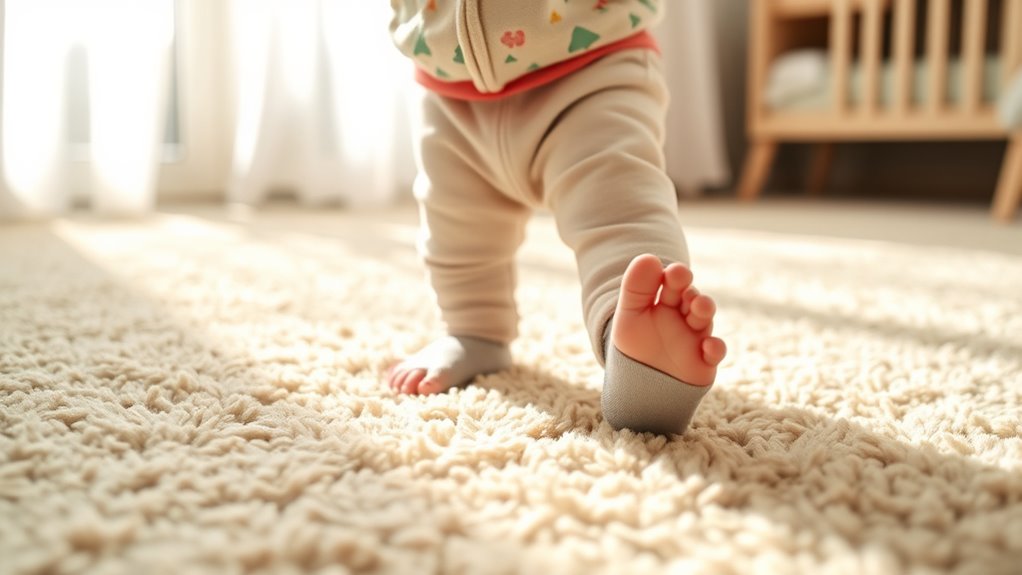
Choosing the right footwear and clothing for early walkers is essential to support their developing muscles and guarantee safety. When selecting footwear, opt for lightweight, flexible shoes with non-slip soles to improve grip and balance. Proper footwear should fit well without being too tight, allowing natural toe movement. For clothing, prioritize comfort by choosing soft, breathable fabrics that don’t restrict movement. Clothing with simple fastenings makes it easier for your baby to dress and undress independently, promoting confidence. Avoid stiff or bulky shoes and heavy clothing that can hinder mobility or cause discomfort. Focus on footwear selection and clothing comfort to ensure your baby feels secure and free to explore, helping them build confidence in their new walking abilities.
How to Support Your Baby’s Confidence During This New Skill
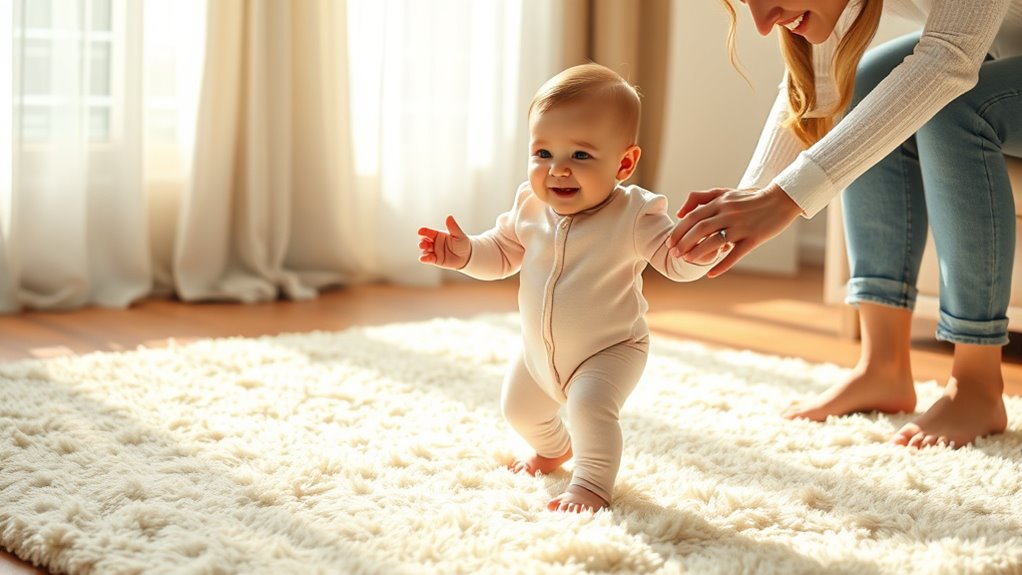
Supporting your baby’s confidence as they learn to walk is crucial because a positive experience encourages continued effort and independence. You can foster this by creating a supportive environment that boosts their self-esteem. Celebrate small wins, like standing alone or taking a few steps, to motivate them further. Encourage independence by offering safe spaces where they can practice walking without pressure. Use gentle praise to reinforce their efforts and progress. Keep interactions positive, avoiding criticism or excessive help. Providing encouragement helps your baby see walking as an achievable goal. Remember, patience is key—every step, no matter how small, is a step toward confidence and independence. By nurturing their efforts, you help your little one develop resilience and joy in learning to walk.
When to Consult a Pediatrician About Walking Concerns
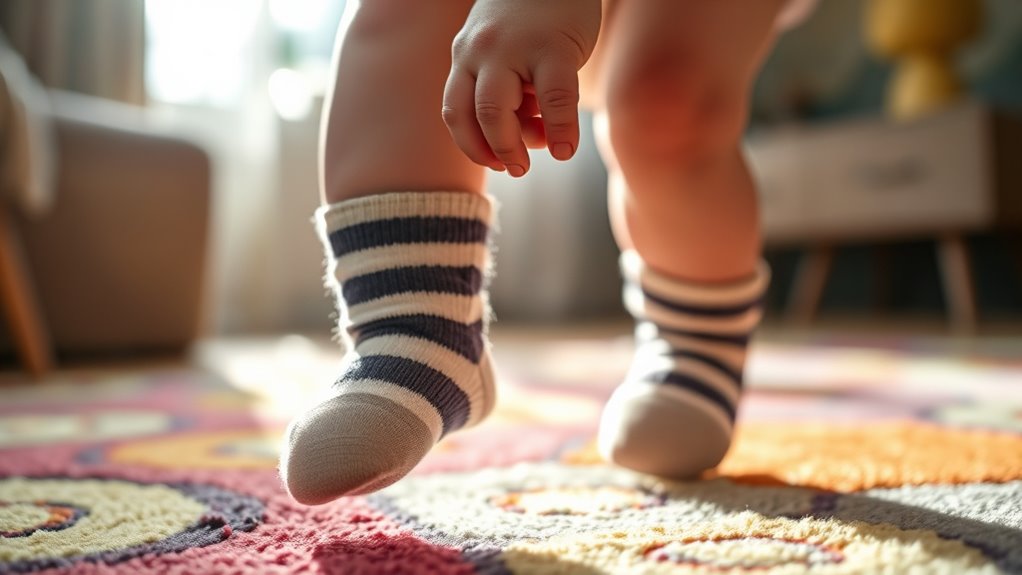
While most babies start walking between 9 and 15 months, it’s important to know when to seek professional advice if you have concerns. If your baby shows signs of delayed early crawling or hasn’t begun to stand with support by 15 months, it’s time to consult a pediatrician. Limited sensory play that encourages exploration or weak muscle tone might be contributing factors. Trust your instincts—if your baby isn’t showing interest in moving or lacks the strength to support weight, a professional evaluation can help identify underlying issues. Early intervention can make a difference. Remember, every child develops at their own pace, but persistent concerns warrant professional guidance to ensure your little one’s growth stays on track.
Frequently Asked Questions
How Can I Tell if My Baby Is Truly Ready to Walk?
You can tell if your baby is truly ready to walk by observing their developmental milestones and sensory readiness. Look for signs like pulling up to stand, cruising along furniture, and steady balance. If your baby shows increased curiosity and coordination, they’re likely ready. Trust their cues and give them safe opportunities to practice walking, supporting their confidence and motor skills as they prepare to take those first steps.
Are There Specific Exercises to Help My Baby Walk Faster?
You can help your baby walk faster by encouraging tummy time and crawling, which strengthen their muscles and coordination. While there aren’t specific exercises to speed up walking, promoting these activities fosters development naturally. Make tummy time engaging with toys and praise, and encourage crawling by creating a safe space for exploration. These activities build the skills and confidence your baby needs to take those first steps confidently and comfortably.
What Are Common Setbacks or Delays in Walking Development?
You might notice setbacks like balance issues or delays in muscle strength that can slow your baby’s walking development. These are common and often temporary, caused by variations in growth or coordination. To support your little one, encourage tummy time, provide safe space for practice, and be patient. If concerns persist, consult a pediatrician to rule out underlying issues and get personalized guidance to help your baby progress confidently.
How Do Genetics Influence a Child’s Walking Timeline?
Think of your child’s walking timeline as a unique garden, shaped by genetic variability. Inherited traits act like the seeds that influence growth speed and strength. Genetics can determine how quickly your little one develops their muscles and coordination, affecting when they take their first steps. While every child blooms at their own pace, understanding these genetic influences helps you support their journey with patience and encouragement.
Can Early Walking Indicate Future Motor Skill Development Issues?
Early walking doesn’t necessarily mean there will be motor development issues later. If your baby starts walking early, it could just be a sign of advanced motor skills, but it’s important to monitor for other developmental milestones. Every child develops at their own pace, so focus on supporting their motor development through activities and encouragement. If you’re concerned, consult your pediatrician to ensure your little one’s progress stays on track.
Conclusion
Remember, every baby’s timeline is different—some take their first steps as early as nine months, others closer to 15 months. It’s a common myth that early walking guarantees future athleticism; what truly matters is encouraging confidence and fun. Stay patient, celebrate small victories, and trust your instincts. Enjoy these precious milestones—before you know it, those tiny steps will turn into big adventures!

